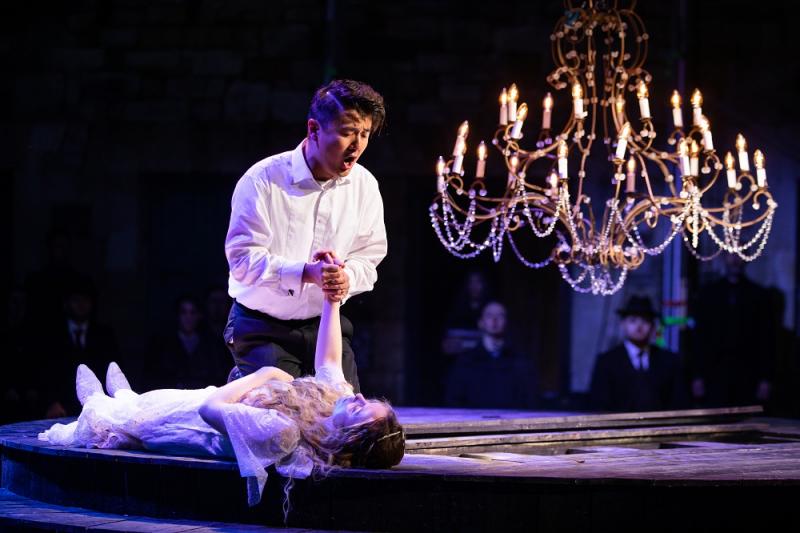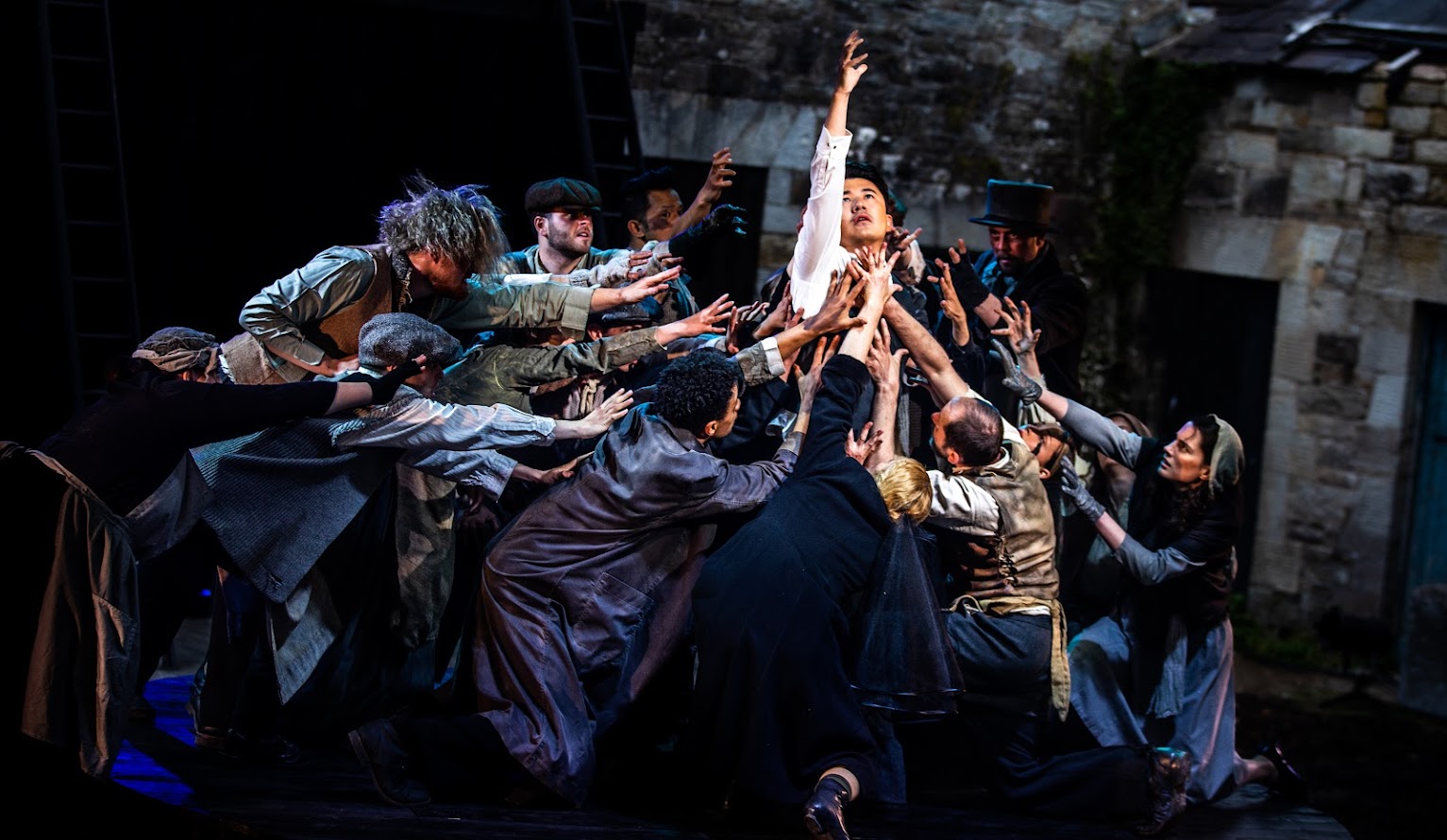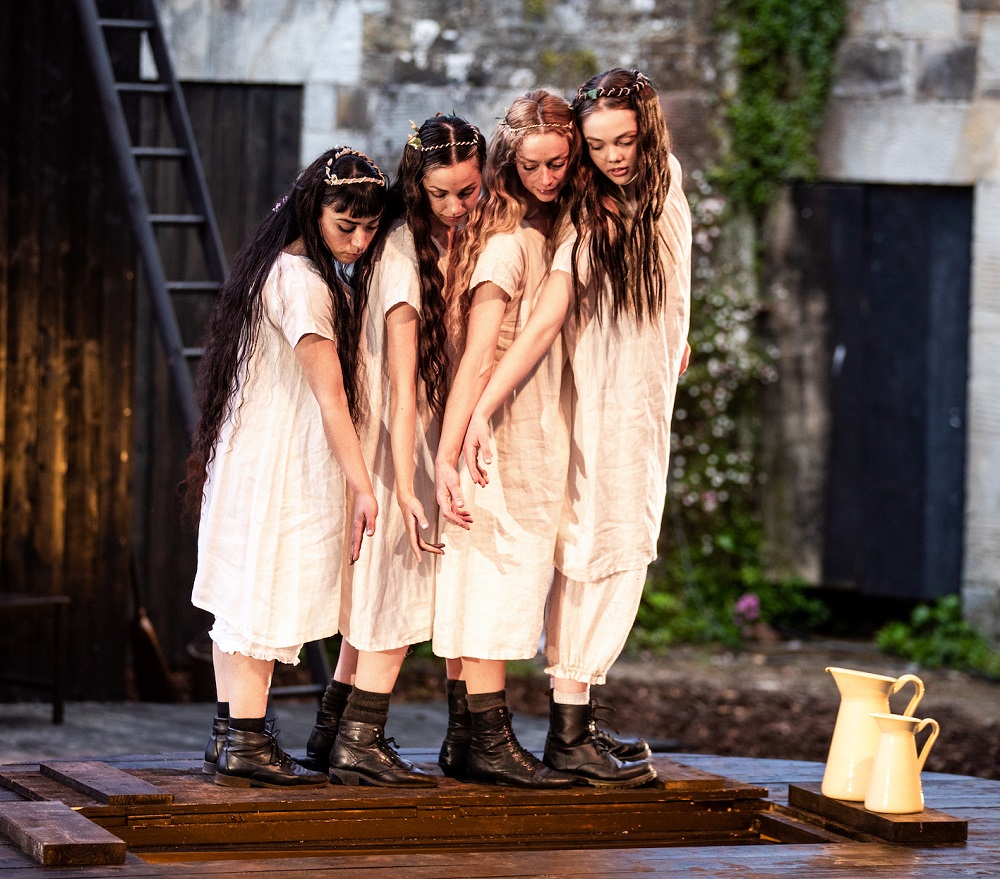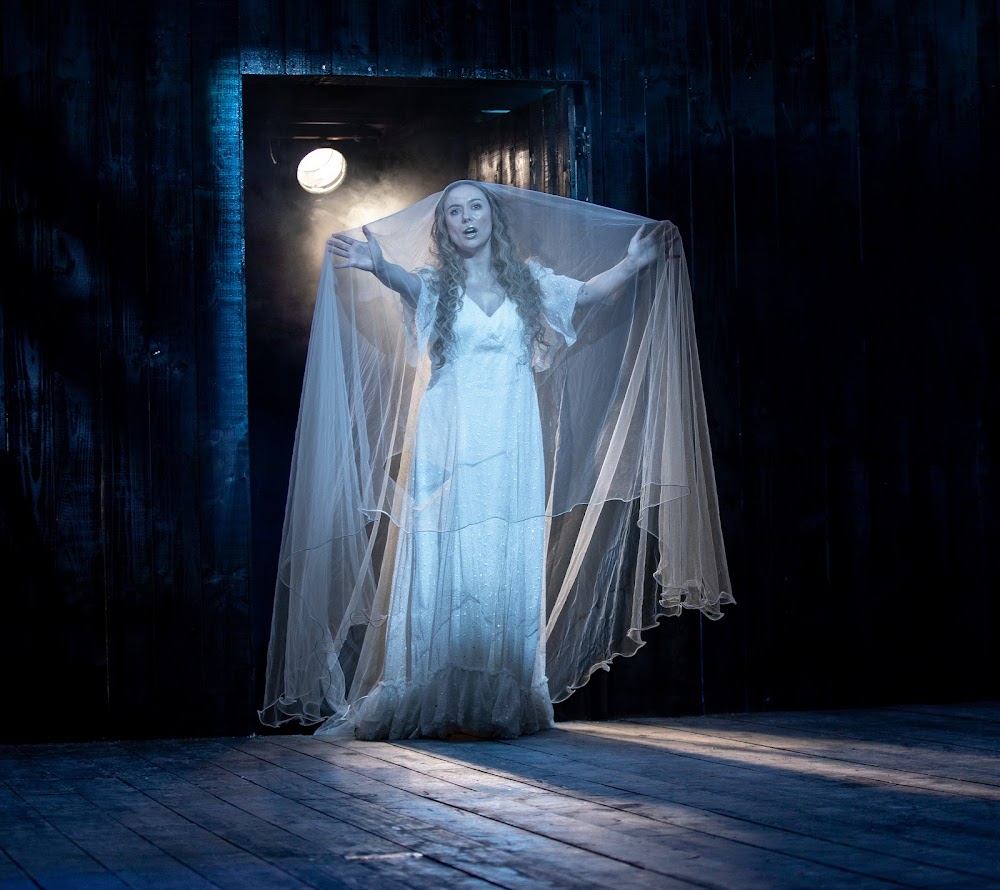Orfeo ed Euridice, Blackwater Valley Opera Festival review - heavenly possibilities, devils at work in the details | reviews, news & interviews
Orfeo ed Euridice, Blackwater Valley Opera Festival review - heavenly possibilities, devils at work in the details
Orfeo ed Euridice, Blackwater Valley Opera Festival review - heavenly possibilities, devils at work in the details
Talented team of singers, players and dancers at the mercy of capricious circumstances

"Elysian" is the best way to describe the dream gardens of Ireland's Lismore Castle in early June: lupins, alliums and peonies rampant in endless herbaceous borders, supernatural perspectives towards the main building on various levels. This year’s Blackwater Valley Opera Festival production of Gluck's Orfeo ed Euridice, not so much: easily adjustable circumstances worked too often against talented performers in the converted stables space pressed into service once a year.
Let’s start with the placement of the Irish Baroque Orchestra, so phenomenal under conductor Peter Whelan playing for the Irish National Opera in Vivaldi's Bajazet (the team deservedly won an Olivier Award). They were the spur for making a rather complex journey from Dublin via Waterford to the heart of the wooded valley. Housed to one side of audience and open stage in what could have been a byre, without resonance or the option to blend – simple acoustic adjustments could have made all the difference – and with poor sightlines to the main action, their disadvantage rebounded on the singers: the 12-strong young chorus needed to be able to see Whelan in the rush of anger the Furies unleash on Orfeo as he descends to retrieve Euridice (pictured below). Turned to the other side, they couldn’t keep time with their conductor; I'm told screens were visible, but in the heat of the moment they must have been ignored.  Then there was the singing of Euridice, very fine when she finally appeared in Act Three, but rather unwelcome in all-too-clear vocal exercises through much of Act One and the first scene of Act Two. Had she done this on previous nights? Why did no-one involved rush round and tell her to stop?
Then there was the singing of Euridice, very fine when she finally appeared in Act Three, but rather unwelcome in all-too-clear vocal exercises through much of Act One and the first scene of Act Two. Had she done this on previous nights? Why did no-one involved rush round and tell her to stop?
Putting David Bolger, Artistic Director and co-founder of CoisCéim Dance Company, in charge of what is in essence an 18th century opera-ballet, was a bold move. His team of eight charismatic dancers rose to the challenge of the set pieces in diverse nimble and original ways; but I rather thought before consulting the programme that we had a brilliant choreographer at odds with an over-ambitious director. Bolger’s ideas on the latter front were hit and miss: a mourning ritual in costumes stylishly designed by Maree Kearns that worked; Les Mis chorus people as Furies – class division? – ushered in by a noisy sweeping away of funeral flowers drawing focus away from the orchestral blasts at the start of Act 2, which didn’t.  Surely, too, it was a mistake to have a break before the balm of the Elysian Fields, which should strike us musically by immediate contrast, and the Grecian water-ceremony was original in itself (pictured above), but only half in tune with the verdant landscapes, complete with birdsong, conjured up by the tone-painting of Orfeo’s “Che puro ciel”.
Surely, too, it was a mistake to have a break before the balm of the Elysian Fields, which should strike us musically by immediate contrast, and the Grecian water-ceremony was original in itself (pictured above), but only half in tune with the verdant landscapes, complete with birdsong, conjured up by the tone-painting of Orfeo’s “Che puro ciel”.
The crucial journey back to the world in the first half of Act Three worked best at every level. Before it, Chinese countertenor Meili Li hardly seemed the ideal choice to build a production around (the opera can’t succeed without a strong Orfeo). Choppy lines, some trumpet notes but nothing in the lower register, slightly tentative acting – all these were banished by the time of Orfeo’s desperation at his Euridice’s pleas to him to engage with her.
 Aoife Gibney as Euridice (pictured left) was the most accomplished of the three soloists – light soprano Kelli-Ann Masterson as Amor needs to work on her Italian – and conveyed the meaning of every line (ironically, since the supertitles which hadn’t worked before the interval, when we needed them, were now restored). And then Li delivered something altogether more personable in Gluck’s best-known number, “Che farò senza Euridice”: a riveting delivery of schizoid switches between soft-voiced tenderness and lacerating grief, complete with well-judged ornamentations. If only Bolger hadn’t decided to end with predictable alienation – Orfeo drifts away as all attention is turned towards the restored-to-life queen of the moment, Euridice – then the sense of late-flowering elation would have been complete. And Eamon Fox’s lighting design as night fell had drawn us further into involvement.
Aoife Gibney as Euridice (pictured left) was the most accomplished of the three soloists – light soprano Kelli-Ann Masterson as Amor needs to work on her Italian – and conveyed the meaning of every line (ironically, since the supertitles which hadn’t worked before the interval, when we needed them, were now restored). And then Li delivered something altogether more personable in Gluck’s best-known number, “Che farò senza Euridice”: a riveting delivery of schizoid switches between soft-voiced tenderness and lacerating grief, complete with well-judged ornamentations. If only Bolger hadn’t decided to end with predictable alienation – Orfeo drifts away as all attention is turned towards the restored-to-life queen of the moment, Euridice – then the sense of late-flowering elation would have been complete. And Eamon Fox’s lighting design as night fell had drawn us further into involvement.
It's admirable that BVOF sees participation and learning for young singers as part of its programme, but the chorus was almost sabotaged by a foghorn bass. An out-of-tune harp among the instruments was not the consummate performer’s fault, though – the damp day had played havoc with one of the strings – and the chalumeau (early clarinet) solo echoing Orfeo in Act 1 certainly added character. It seemed a shame to be purist about the original 1762 Vienna version; to do without the minor-key flute solo in the "Dance of the Blessed Spirits", added for Paris in 1774 feels as incomplete as Mozart's Don Giovanni without Donna Elvira's "Mi tradì" (a Vienne addition to the Prague original).
I’d love to have been able to stay for the final event last night, though – Handel from the IBO and Whelan working with two Spanish singers in a more promising rustic acoustic – and it’s clear that the festival as a whole has been well planned by artistic director Dieter Kaegi. And – since these things matter – I must say that the picnics were excellent, too. Here’s to tweaks to make next year perfect.
rating
Explore topics
Share this article
The future of Arts Journalism
You can stop theartsdesk.com closing!
We urgently need financing to survive. Our fundraising drive has thus far raised £49,000 but we need to reach £100,000 or we will be forced to close. Please contribute here: https://gofund.me/c3f6033d
And if you can forward this information to anyone who might assist, we’d be grateful.

Subscribe to theartsdesk.com
Thank you for continuing to read our work on theartsdesk.com. For unlimited access to every article in its entirety, including our archive of more than 15,000 pieces, we're asking for £5 per month or £40 per year. We feel it's a very good deal, and hope you do too.
To take a subscription now simply click here.
And if you're looking for that extra gift for a friend or family member, why not treat them to a theartsdesk.com gift subscription?
more Opera
 La bohème, Opera North review - still young at 32
Love and separation, ecstasy and heartbreak, in masterfully updated Puccini
La bohème, Opera North review - still young at 32
Love and separation, ecstasy and heartbreak, in masterfully updated Puccini
 Albert Herring, English National Opera review - a great comedy with depths fully realised
Britten’s delight was never made for the Coliseum, but it works on its first outing there
Albert Herring, English National Opera review - a great comedy with depths fully realised
Britten’s delight was never made for the Coliseum, but it works on its first outing there
 Carmen, English National Opera review - not quite dangerous
Hopes for Niamh O’Sullivan only partly fulfilled, though much good singing throughout
Carmen, English National Opera review - not quite dangerous
Hopes for Niamh O’Sullivan only partly fulfilled, though much good singing throughout
 Giustino, Linbury Theatre review - a stylish account of a slight opera
Gods, mortals and monsters do battle in Handel's charming drama
Giustino, Linbury Theatre review - a stylish account of a slight opera
Gods, mortals and monsters do battle in Handel's charming drama
 Susanna, Opera North review - hybrid staging of a Handel oratorio
Dance and signing complement outstanding singing in a story of virtue rewarded
Susanna, Opera North review - hybrid staging of a Handel oratorio
Dance and signing complement outstanding singing in a story of virtue rewarded
 Ariodante, Opéra Garnier, Paris review - a blast of Baroque beauty
A near-perfect night at the opera
Ariodante, Opéra Garnier, Paris review - a blast of Baroque beauty
A near-perfect night at the opera
 Cinderella/La Cenerentola, English National Opera review - the truth behind the tinsel
Appealing performances cut through hyperactive stagecraft
Cinderella/La Cenerentola, English National Opera review - the truth behind the tinsel
Appealing performances cut through hyperactive stagecraft
 Tosca, Royal Opera review - Ailyn Pérez steps in as the most vivid of divas
Jakub Hrůša’s multicoloured Puccini last night found a soprano to match
Tosca, Royal Opera review - Ailyn Pérez steps in as the most vivid of divas
Jakub Hrůša’s multicoloured Puccini last night found a soprano to match
 Tosca, Welsh National Opera review - a great company reduced to brilliance
The old warhorse made special by the basics
Tosca, Welsh National Opera review - a great company reduced to brilliance
The old warhorse made special by the basics
 BBC Proms: The Marriage of Figaro, Glyndebourne Festival review - merriment and menace
Strong Proms transfer for a robust and affecting show
BBC Proms: The Marriage of Figaro, Glyndebourne Festival review - merriment and menace
Strong Proms transfer for a robust and affecting show
 BBC Proms: Suor Angelica, LSO, Pappano review - earthly passion, heavenly grief
A Sister to remember blesses Puccini's convent tragedy
BBC Proms: Suor Angelica, LSO, Pappano review - earthly passion, heavenly grief
A Sister to remember blesses Puccini's convent tragedy
 Orpheus and Eurydice, Opera Queensland/SCO, Edinburgh International Festival 2025 review - dazzling, but distracting
Eye-popping acrobatics don’t always assist in Gluck’s quest for operatic truth
Orpheus and Eurydice, Opera Queensland/SCO, Edinburgh International Festival 2025 review - dazzling, but distracting
Eye-popping acrobatics don’t always assist in Gluck’s quest for operatic truth

Add comment